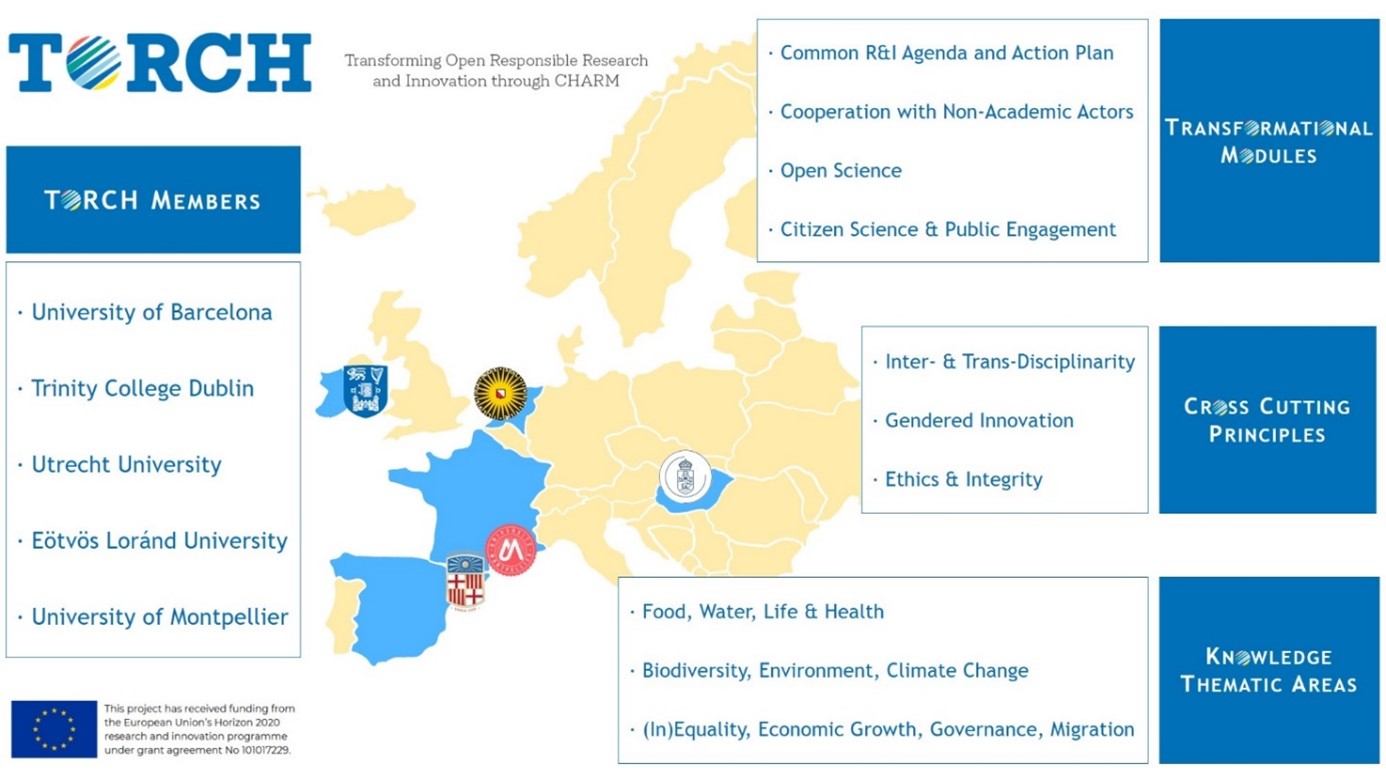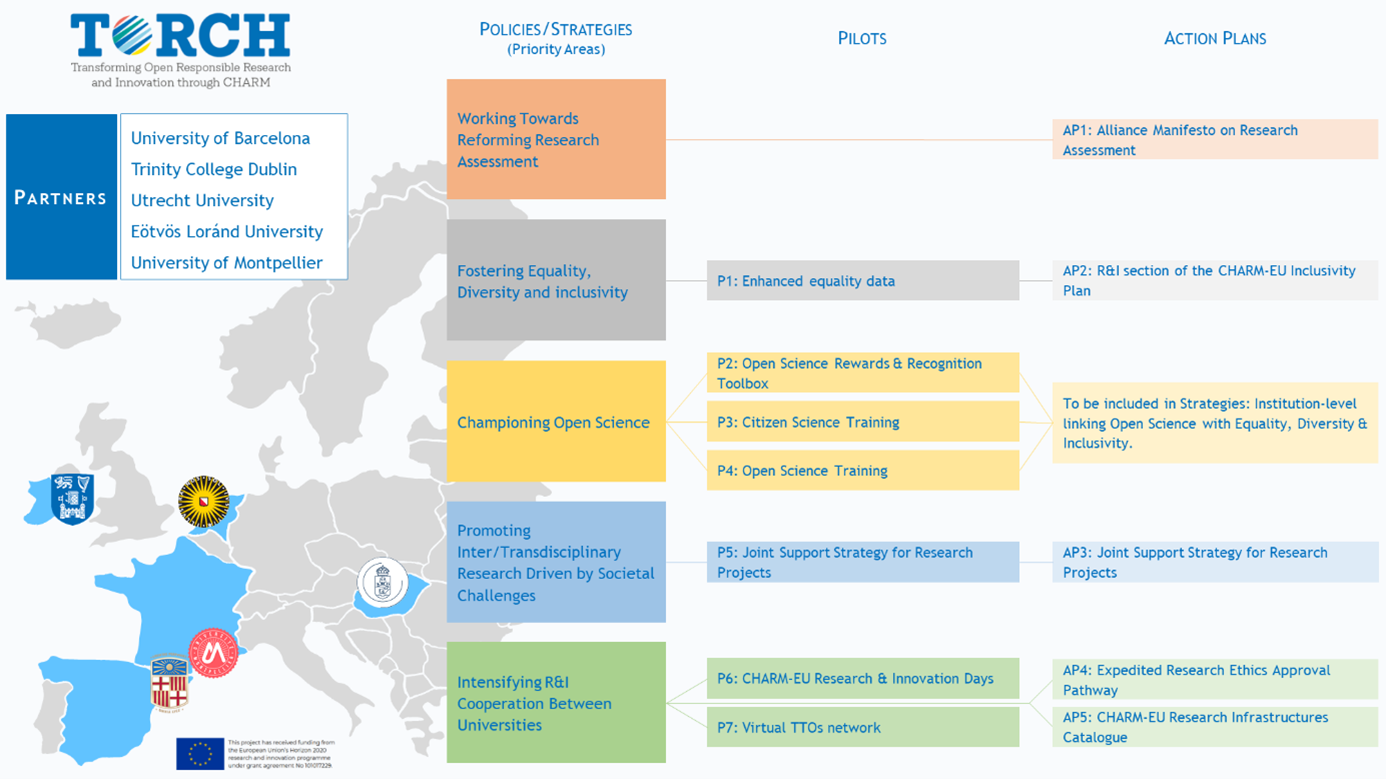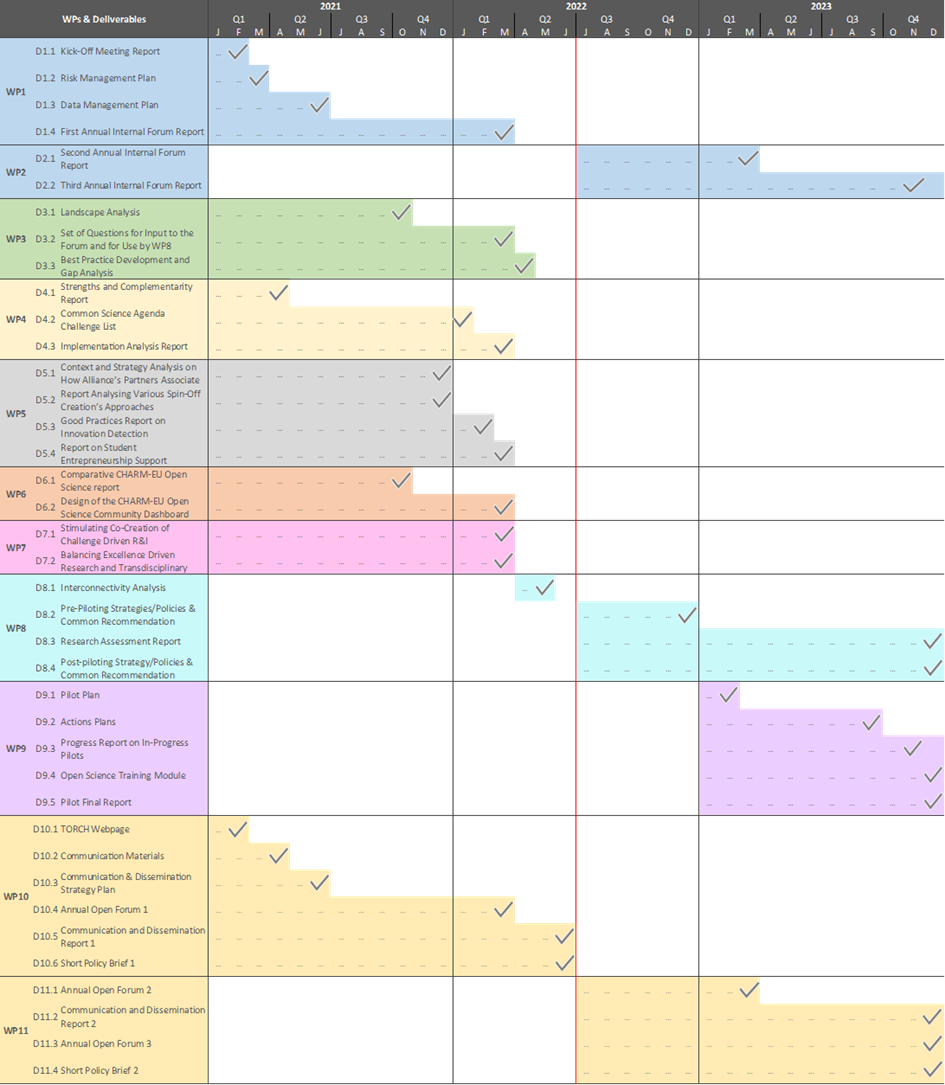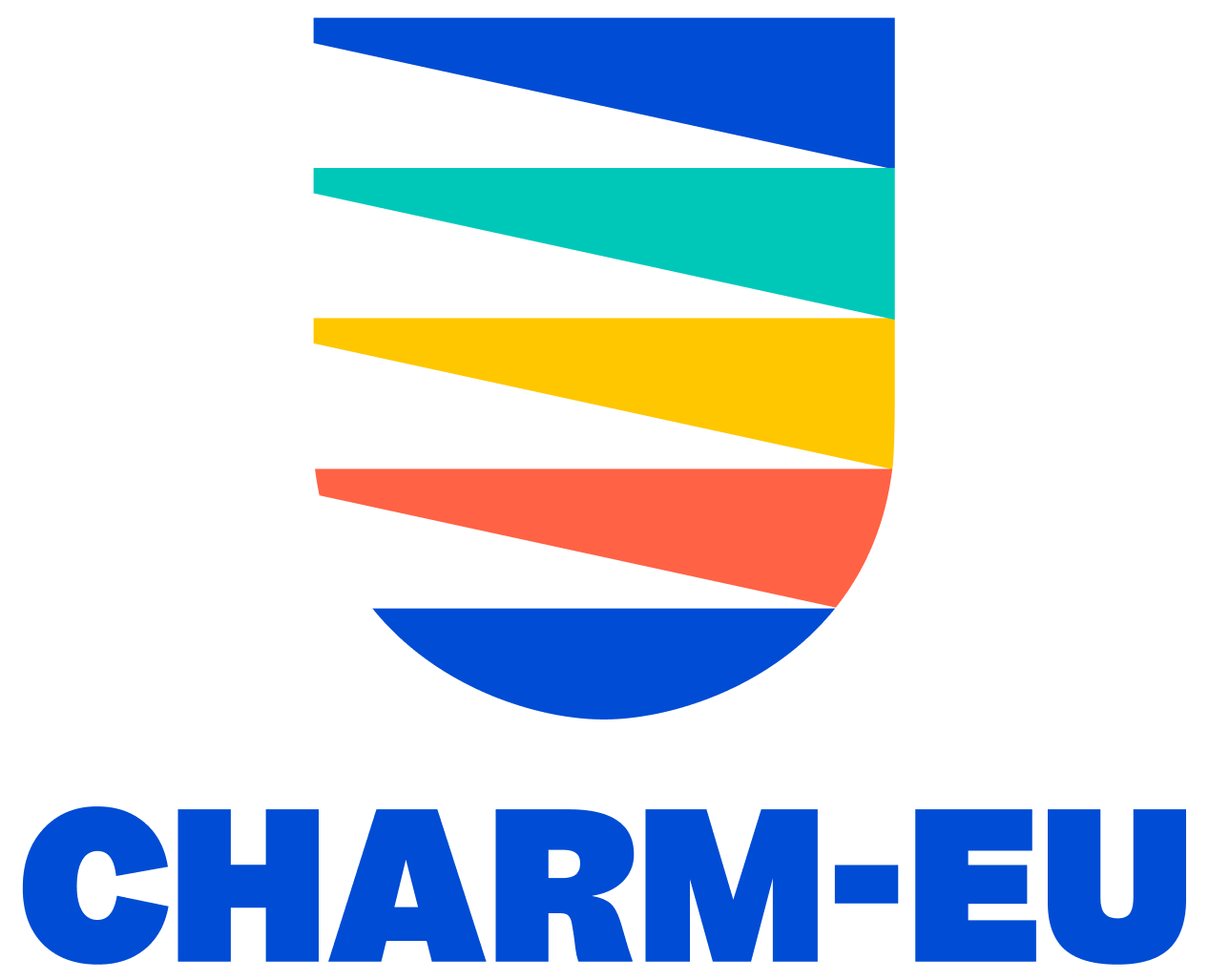TORCH Research and Innovation Project
The TORCH project was created with the aim of developing a common Research and Innovation (R&I) agenda for the Alliance’s five founding research universities.
The work undertaken in TORCH covered the definition of cross-cutting principles, the development of joint research plans, and the assessment of good practices in fields such as collaborations with the civil and corporate sectors, open science, and citizen science.

Overview
TORCH: Transforming Open Responsible Research and Innovation through CHARM.
The TORCH Project built up CHARM-EU’s R&I dimension, promoting a challenge-driven transformative agenda based on (Figure 1):
- 3 RRI Cross Cutting Principles: Interdisciplinarity; Gendered Innovation; Ethics and Integrity.
- 4 Transformational Modules: Common R&I Agenda; Cooperation with Non-Academic Actors; Open Science; Citizen Science and Public Engagement.
- 3 Scientific Thematic Areas: Food, Water, Life & Health; Biodiversity, Environment, Climate Change; (In)Equality, Economic Growth, Governance, Migration.
TORCH promotes gender equality in R&I policies and fosters Open Science, supports transdisciplinary and intercultural approaches through cooperation and engagement with societal stakeholders and non-academic actors, and aims to drive impact at three different levels (Alliance, university, society), with a priority in accelerating and catalysing processes of institutional change within the CHARM-EU members.

Main conclusions:
- Landscape and gap analysis around the transformational modules.
- First steps taken to set up the CHARM-EU Common Science Agenda, including definition of scientific areas and development of SDG-driven research challenges.
- 5 priority areas established, in line with ERA Policy Agenda, upon which the CHARM-EU dimension is built: 1. Working towards reforming research assessment; 2. Fostering equality, diversity and inclusivity; 3. Championing Open Science; 4. Promoting inter/transdisciplinary research driven by societal challenges; 5. Intensifying R&I cooperation between universities.
- 7 Pilots and 5 Action Plans developed to advance the priority areas (Figure 2).

PROJECT STRUCTURE & TIMELINE
WP | WP Leader | WP Title |
WP1 | UB | Governance and Project Management – 1 |
WP2 | UB | Governance and Project Management – 2 |
WP3 | TCD | Cross Cutting Principles |
WP4 | UB | Common Science Agenda |
WP5 | UM | Strengthening Cooperation Between Universities and Enterprises |
WP6 | ELTE | Mainstreaming of Comprehensive Open Science Practices |
WP7 | UU | Public Engagement |
WP8 | TCD | Common Policies and Strategies |
WP9 | ELTE | Actions Plans and Pilots |
WP10 | UB | Communication and Dissemination – 1 |
WP11 | UB | Communication and Dissemination – 2 |
TORCH WP1 and WP2 focused on Governance and Project Management. Key activities included: implementing the TORCH governance structure; coordinating work plans, WPs and research challenges development; handling reporting to REA, financial matters, and integration with CHARM educational projects.
WP3 (Cross Cutting Principles) uncovered ways in which universities could do better to support inter-/transdisciplinarity, promote more research gendered innovation and enshrine a broader view on research ethics and integrity. This will feed into shared strategies and policies for a Common RRI Framework.
WP4 (Common Science Agenda) set a stepping stone towards CHARM-EU’s Common Scientific Agenda. Harmonization of diverse institutional research priorities will be achieved by exploring collaborative ways (involving researchers and universities leadership). The method proved to be a valid pathway to establish researchers’ networks with shared scientific interests via SDG-driven goals. The six research challenges were developed further by multidisciplinary teams to target European funding to implement them as research projects from 2023 onwards.
Current strategies, policies and organizational models were detected through WP5 (Strengthening Cooperation Between Universities and Enterprises), establishing the basis for future cooperation to achieve greater involvement of entrepreneurial researchers, students, and partner enterprises. A university-enterprise policy procedure to “identify innovation resulting from research projects with a potential for transfer” could be developed, to set up a more concrete collaboration between RSOs and TTOs by means of a potential virtual network.
WP6 (Mainstreaming of Comprehensive Open Science practices) identified strengths and gaps on an institutional level regarding Open Science, and developed a set of recommendations. Sharing good practices helps making Open Science a mainstream practice among researchers and institutions.
WP7 (Public Engagement) output can be taken forward and deliver potential impacts on how to harness public engagement and transdisciplinary science in a way that stimulates involvement of the underprivileged in society. It is key to further explore the contentious issues of open science as a larger movement, including to address the issue of power asymmetry in the production and utilization of knowledge for solving societal challenges.
WP8 (Common Policies and Strategies) drew together work in work packages 3-7 to draft, develop, test (via WP9), and review a set of five Strategic Priority Areas as well as a common recommendations framework to sit within CHARM-EU research & innovation agenda. The work in this WP guided and informed all research activities in terms of goals, values, vision and best practice for the Alliance in the years to come. We intend to be open and proactive in exchanging recommendations and best practice with other alliances, non-academic collaborators and other external stakeholders.
WP9 (Action Plans and Pilots) tested several transferrable methods and reached tangible and exploitable results through seven Pilots that are linked with Equity, Diversity and Inclusion, Open Science, joint alliance-level research support, networking of universities’ units. These actions also contributed to proposing a comprehensive reform of Research Assessment reform in CHARM-EU on a longer term. The WP also produced five Action Plans to be carried out after the end of the project. Recommendations were provided for tuning and finalising Alliance-level RRI policies and strategies.
WP10 and WP11 (Communication and Dissemination) developed communication materials, dissemination strategy, and organized open annual forums: 1st) Mar-2022, Budapest; 180+ participants, 10+ Alliances represented; 2nd) Mar-2023, Dublin; 120+ participants, 15 Alliances represented; 3rd) Joint event with fellow Alliances, Nov-2023, Brussels; 250+ participants, 37 Alliances represented. Also drafted 2 Policy Briefs with recommendations to the EC for further policy development.

List of deliverables
Following CHARM-EU’s commitment with the Open Science principles, and to make sure the project results are openly available for the academic community and general public, all public deliverables and reports can be found at the CHARM-EU Zenodo Community.
WP | Lead | Deliverable | Title | Link to Report | Dissemination Level |
WP1 | UB | D1.1 | Kick-off meeting | Public | |
D1.2 | Risk Management plan |
| Confidential | ||
D1.3 | Data Management plan |
| Confidential | ||
D1.4 | First Annual Internal Forum Report – Internal Programme |
| Confidential | ||
WP2 | UB | D2.1 | Second Annual Internal Forum Report – Internal Meeting |
| Confidential |
D2.2 | Third Annual Internal Forum Report – Internal Meeting |
| Confidential | ||
WP3 | TCD | D3.1 | Landscape Analysis |
| Confidential |
D3.2 | Set of questions for input to the Forum and for use by WP8 | Public | |||
D3.3 | Best Practice Development and Gap Analysis |
| Confidential | ||
WP4 | UB | D4.1 | Strengths and complementarity report |
| Confidential |
D4.2 | Common Science Agenda challenge list | Public | |||
D4.3 | Implementation analysis report |
| Confidential | ||
WP5 | UM | D5.1 | Context and strategy analysis on how alliance’s partners associate with non-academic-actors | Public | |
D5.2 | Report analyzing various spin-off creation’s approaches | Public | |||
D5.3 | Good practices report on innovation’s detection | Public | |||
D5.4 | Report on students entrepreneurship support methods | Public | |||
WP6 | ELTE | D6.1 | Comparative CHARMEU Open Science report |
| Confidential |
D6.2 | Design of the CHARMEU Open Science Community Dashboard |
| Confidential | ||
WP7 | UU | D7.1 | Stimulating co-creation of challenge driven R&I | Public | |
D7.2 | Balancing excellence driven research and transdisciplinary research and public engagement | Public | |||
WP8 | TCD | D8.1 | Interconnectivity Analysis |
| Confidential |
D8.2 | Pre-Piloting Strategies/Policies & common recommendations Framework |
| Confidential | ||
D8.3 | Research Assessment Report | Public | |||
D8.4 | Post-piloting of Strategy/Policies & common recommendations Framework | Public | |||
WP9 | ELTE | D9.1 | Pilot Plan |
| Confidential |
D9.2 | Actions Plans |
| Confidential | ||
D9.3 | Progress report on in-progress pilots |
| Confidential | ||
D9.4 | Open Science Training Module |
| Confidential | ||
D9.5 | Pilot Final Report | Public | |||
WP10 | UB | D10.1 | TORCH web page | Public | |
D10.2 | Communication materials | Public | |||
D10.3 | Communication and dissemination strategy and action plan | Public | |||
D10.4 | Annual Open Forum 1 Report | Public | |||
D10.5 | Communication and Dissemination Report 1 | Public | |||
D10.6 | Short policy brief 1 | Public | |||
WP11 | UB | D11.1 | Annual Open Forum 2 Report | Public | |
D11.2 | Communication and dissemination Report 2 | Public | |||
D11.3 | Annual Open Forum 3 Report | Public | |||
D11.4 | Short policy brief 2 | Public |
OTHER RESOURCES & RESULTS
- Mapping the Alliances R&I Best Practices Around the SwafS Projects Transformational Modules. DOI 10.5281/zenodo.10654108
This poster highlights 32 Alliances’ examples on best practices and outcomes of their R&I projects, organized around the seven transformational modules. All the Alliances’ results are linked within the poster and can be accessed at once.
- TORCH Common Science Agenda: Driving Collaboration and Transdisciplinary Research to Address Global Sustainability Challenges. DOI 10.5281/zenodo.10581232
Overarching goal of TORCH’s transformative research agenda: to foster collaboration within CHARM-EU by exploring common research interests and to unite researchers around major societal challenges in order to engage in responsible transdisciplinary research.
- TORCH Open Science Survey and Gap Analysis. DOI 10.5281/zenodo.10581268
This report contains the survey responses in summarised and raw formats along with their analysis. Furthermore, we list a number of recommended actions to further improve and propagate each pillar of Open Science. The experiences, best practices, solutions, and strategies shared in this document should help the members of the Alliance decrease the local barriers for mainstreaming Open Science in their research community.
- Guide of Experts
A tool to foster collaboration in multidisciplinary research projects and the creation of new researchers’ networks.
- Scientific Collaboration Networks Apps
Interactive tools based on bibliographic analysis of current authorship networks that help you to search publications and discover inter-institutional research collaboration networks within CHARM-EU.
- Catalogue of research management units
This section provides direct contacts for research management guidance, funding opportunities, and administrative support. With these resources, you can streamline your research projects and maximize their impact, leveraging the full potential of the CHARM-EU network.
- TORCH Consortium and Project Details (webpage in CORDIS): https://cordis.europa.eu/project/id/101017229












